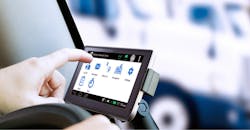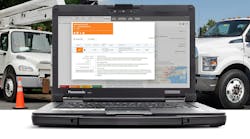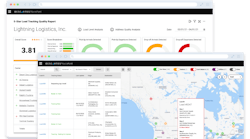ELDs (electronic logging devices) have been making news for over a year now, since officially becoming part of the trucking industry lexicon last Dec. 18, when their usage was mandated for most commercial truckers by the Federal Motor Carrier Safety Administration (FMCSA) and U.S. Department of Transportation (DOT) in order to improve road and personal safety. ELDs have generated a lot of talk, action and reaction.
While many long-time truckers have groused over having to change course from notating their data in paper logbooks well into their careers, Fleet Owner was told by ELD manufacturers, trucking firm executives, and technology consultants that there are many more gains from the devices than had been expected.
This week we’ll be highlighting some of those benefits each day on FleetOwner.com:
- Are ELDs making trucking safer?
- How ELDs are making and saving fleets more money
- Will drivers eventually reap the rewards of ELDs?
More data means more ways to perfect the system
“Fleets which have gone the full-featured ELD route now have a ton of data on fleet operations that they didn’t have before,” noted Brian McCoy, vice president, MiX Telematics, a global provider of fleet management, driver safety, and vehicle tracking services and solutions. “That’s enabling them to drill down and find additional opportunities for improvement; preventive maintenance, scheduling, staffing, you name it. Data and measurement are crucial for operational improvement.”
Eric Witty, vice president of product at Trimble Transportation, which provides integrated onboard computing and mobile communications systems enabling fleets to get data-driven business intelligence, noted that more than the driver and fleet owner can benefit from ELDs.
“Adding them can provide data to make better decisions and be more efficient,” he said. “In addition, if the right product is purchased, the ELD technology can be a platform that opens the door to using third-party applications, customer-created applications, and other features that the technology itself enables. ELD products are becoming more open and collaborative and enabling technology versus the traditional purpose-built systems of the past. In other words, buy the right system and you can get ELD and other telematics capability, but the door opens to integrate and enable solving new and future problems because of the new technology.”
Taken a step further, Ozzie Flores, marketing and product manager, Teletrac Navman, which provides cloud-based GPS fleet-tracking software, said that “the GPS tracking capabilities on ELD systems should help with flexibility as it gives carriers better insight into where a driver is located and why a driver is in a certain situation in regard to their shipments.
“Notation capabilities through ELDs allow fleet managers and carriers to see if a driver is stuck in traffic or off the road due to adverse weather, off duty at shops for repairs, or waiting to load or unload, which can build the case for revisiting the split sleep berth provision,” he continued.
Easier to pinpoint route problems and other issues
“ELDs are showing carriers where the inefficiencies and delays are in their customer bases and routes, if they are looking,” said Thomas Bray, a transportation industry consultant with J.J. Keller & Associates Inc., which provides electronic logging and mobile technologies, training materials and tools, consulting, and managed services. “Progressive carriers are using this data to drive discussions with their customers and drivers.
“Other carriers have seen the introduction of the ELD as an opportunity to incorporate improvements, such as better communications with the driver, position and route tracking, delay tracking, driver performance tracking, and actual fuel mileage tracking,” Bray said. “In many cases before ELDs, the carrier knew or had seen inefficiencies and issues within the operation but was unable to get accurate tracking to see where the problems actually were since many drivers using paper logs were very good at hiding the inefficiencies and issues. When an ELD with extended capabilities is used, the actual issues become visible and then they can be addressed. This then can help the bottom line.”
Andy Oleson, product manager at Verizon Connect, explained that ELDs allow drivers more time for addressing other concerns now that they don’t have to fill out daily written logbooks.
“From a broader fleet management perspective, it’s important to use fleet compliance software that complements e-logs drivers use to record hours of service,” he stressed. “By doing so, drivers will have a streamlined process to record hours of service that will keep mistakes to a minimum and reduce the stress of completing a daily HOS log.”
* * *




